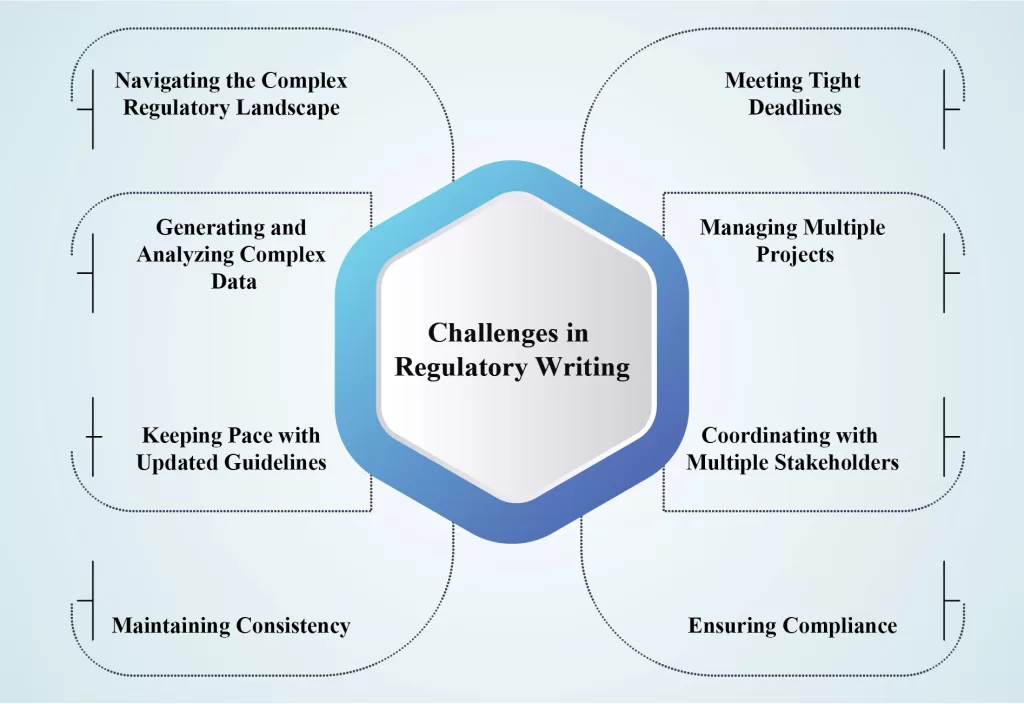Medical Writing Regulatory for Product Excellence: Crafting the Path to Success
Medical writing regulatory is the development of various documents intended for submission to Health Authorities (HAs). These documents play a crucial role in conveying essential information accurately, transparently, and clearly to reviewers while adhering to relevant guidelines. Regulatory medical writers hold significant responsibility in the preparation of these documents, ensuring their accuracy, conciseness, and compliance with prevailing standards.
Ensuring Compliance
Effective regulatory medical writing is essential to maintain regulatory compliance throughout the drug development process. Various documents, such as New Drug Applications (NDAs), Investigational New Drug Applications (INDAs), Marketing Authorization Applications (MAAs), Clinical Study Reports (CSRs), and Clinical Study Protocols (CSPs), require compliant writing. Failure to comply with regulations or deviations while authoring these documents can lead to delays in the drug approval process.
Clinical Development Plan (CDP) and Approval
Regulatory medical writing assumes a crucial role in the process of clinical development planning and approval. CSPs and CSRs are critical documents in this regard. They summarize the objectives, conduct, and results of clinical studies in a clear, precise, and unbiased manner. Well-written clinical documents contribute to high-quality submission documents. Conversely, poorly written documents can cause significant delays in approvals, resulting in increased costs for sponsors. Experienced and skilled writers enhance the value of clinical study documents, ensuring they effectively convey vital clinical trial data to HAs.
Key Challenges in Regulatory Writing
Several challenges arise during regulatory writing:
- Navigating the Complex Regulatory Landscape: Regulations vary across regions, making it challenging to understand and comply with all requirements.
- Meeting Tight Deadlines: Timely completion of documentation is essential in regulatory submissions, as they often have strict timelines that demand efficient work.
- Generating and Analyzing Complex Data: Regulatory writing involves dealing with intricate data, requiring careful interpretation and concise communication.
- Managing Multiple Projects: Writers may have to handle numerous projects concurrently, which can be demanding and require effective multitasking skills.
- Keeping Pace with Updated Guidelines: The dynamic nature of regulatory guidelines necessitates continuous effort to stay updated with the latest requirements.
- Coordinating with Multiple Stakeholders: Regulatory writing necessitates cooperation with a diverse range of stakeholders, such as scientists, clinical teams, marketing teams, and regulatory agencies, resulting in a complex and time-consuming process.
- Maintaining Consistency: The inclusion of multiple documents and sections in regulatory writing presents a challenge in ensuring consistency across all materials.
- Ensuring Compliance: Regulatory writing must adhere to all relevant regulations and guidelines, requiring comprehensive compliance efforts that can be intricate and time-intensive.
Overcoming these challenges requires expertise, attention to detail, a thorough understanding of the regulatory landscape, and efficient collaboration.
Adhering to region-specific regulations is a mandatory requirement for pharmaceutical companies during the marketing of their products. Regulatory writing plays a crucial role in maintaining a clear and consistent brand message throughout all marketing materials. Regulatory medical writers, equipped with their knowledge and skills, contribute significantly to successful marketing and branding efforts.
Qualities of Regulatory Medical Writers
Regulatory writers should possess the following attributes:
- Thorough understanding of regulatory guidelines globally
- Excellent communication skills to collaborate effectively with cross-functional teams, including clinical research, Regulatory Affairs (RA), and medical affairs
- Ability to understand and interpret clinical data, presenting it clearly and concisely to ensure the success of the drug development process
Regulatory writing not only ensures compliance but also plays a crucial role in the success of a product in the market. The documents prepared by skilled writers serve as the bedrock for effective marketing and commercialization strategies. Medical writers, with their expertise, contribute significantly to developing clear, concise, and accurate product labeling. Additionally, the timely preparation and submission of documents by regulatory writers can expedite the approval process, ultimately impacting the drug’s success in the market.
Conclusion
Regulatory medical writing is a vital component for ensuring the success of healthcare and pharmaceutical products. It is essential for compliance, clinical development and approval, and marketing and branding. As compliance requirements evolve with innovation and growth, regulatory writing will become even more important.
Partnering with a regulatory writing expert can help companies comply with regional requirements set by HAs and provide proper guidance to address challenges. WorkSure® offers comprehensive regulatory medical writing services, providing the necessary expertise and guidance to navigate the regulatory landscape, comply with regulations, and effectively convey the brand message. Contact WorkSure® now for professional regulatory support and ensure the success of your products!



